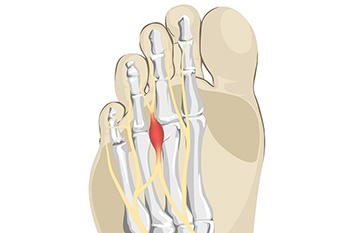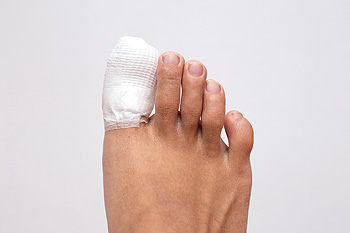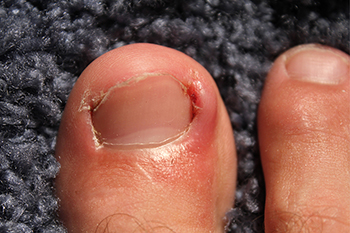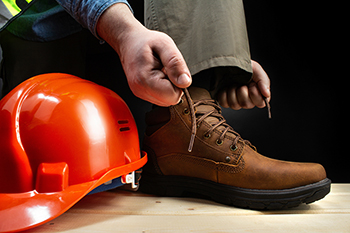Items filtered by date: September 2023
Gout Pain Can Be Managed
Causes and Treatment of Morton’s Neuroma

Morton's neuroma, a painful foot condition, is a thickening of the tissue surrounding the nerves leading to the toes. The area most commonly affected is between the third and fourth toes. Morton’s neuroma can cause discomfort and a sensation of standing on a pebble or having a fold in your sock. It is primarily attributed to repeated pressure and irritation of the nerve, often stemming from wearing tight or high-heeled shoes. Activities that involve repetitive stress on the forefoot, such as running or certain sports, can also contribute to its development. Treatment for Morton's neuroma typically begins conservatively, focusing on alleviating symptoms. This may include wearing wider, more comfortable shoes, or using shoe inserts or orthotics that may provide better arch support and cushioning. Additionally, taking anti-inflammatory medications to reduce pain and inflammation may be helpful. In more severe cases, cortico-steroid injections or surgical intervention to remove the affected nerve may be considered. If you suspect you have Morton's neuroma, it is suggested that you make an appointment with a podiatrist for a proper diagnosis and personalized treatment plan.
Morton’s neuroma is a very uncomfortable condition to live with. If you think you have Morton’s neuroma, contact one of our podiatrists of Parkwood Podiatry. Our doctors will attend to all of your foot care needs and answer any of your related questions.
Morton’s Neuroma
Morton's neuroma is a painful foot condition that commonly affects the areas between the second and third or third and fourth toe, although other areas of the foot are also susceptible. Morton’s neuroma is caused by an inflamed nerve in the foot that is being squeezed and aggravated by surrounding bones.
What Increases the Chances of Having Morton’s Neuroma?
- Ill-fitting high heels or shoes that add pressure to the toe or foot
- Jogging, running or any sport that involves constant impact to the foot
- Flat feet, bunions, and any other foot deformities
Morton’s neuroma is a very treatable condition. Orthotics and shoe inserts can often be used to alleviate the pain on the forefront of the feet. In more severe cases, corticosteroids can also be prescribed. In order to figure out the best treatment for your neuroma, it’s recommended to seek the care of a podiatrist who can diagnose your condition and provide different treatment options.
If you have any questions, please feel free to contact our offices located in Brunswick and Hinesville, GA . We offer the newest diagnostic and treatment technologies for all your foot care needs.
Healing From a Broken Toe

A broken toe can be a painful and frustrating experience, but with patience and proper care, it can mend successfully. The first step in healing a broken toe is to seek medical attention from a podiatrist for an accurate diagnosis and to rule out any complications. Once diagnosed, the primary focus is on rest and protection. This often involves wearing a splint, cast, or buddy taping, which is taping the broken toe to the toe next to it. This is generally successful in immobilizing the injured area. Elevating the foot can help reduce swelling, while taking over-the-counter pain relievers can manage discomfort. Avoid putting weight on the affected toe and opt for comfortable, supportive footwear. Healing times can vary but typically range from a few weeks to a couple of months. As your toe begins to mend, performing several range of motion exercises that can aid in recovery is beneficial. If you have broken your toe, it is suggested that you are under the care of a podiatrist who can guide you toward the best treatment methods for you.
A broken toe can be very painful and lead to complications if not properly fixed. If you have any concerns about your feet, contact one of our podiatrists from Parkwood Podiatry. Our doctors will treat your foot and ankle needs.
What to Know About a Broken Toe
Although most people try to avoid foot trauma such as banging, stubbing, or dropping heavy objects on their feet, the unfortunate fact is that it is a common occurrence. Given the fact that toes are positioned in front of the feet, they typically sustain the brunt of such trauma. When trauma occurs to a toe, the result can be a painful break (fracture).
Symptoms of a Broken Toe
- Throbbing pain
- Swelling
- Bruising on the skin and toenail
- The inability to move the toe
- Toe appears crooked or disfigured
- Tingling or numbness in the toe
Generally, it is best to stay off of the injured toe with the affected foot elevated.
Severe toe fractures may be treated with a splint, cast, and in some cases, minor surgery. Due to its position and the pressure it endures with daily activity, future complications can occur if the big toe is not properly treated.
If you have any questions please feel free to contact our offices located in Brunswick and Hinesville, GA . We offer the newest diagnostic and treatment technologies for all your foot and ankle needs.
Understanding the Causes of Ingrown Toenails

Ingrown toenails are painful foot problems, and can disrupt your daily life, leading to discomfort. Understanding the causes behind them is crucial for prevention and effective management. A common culprit is improper toenail trimming. Cutting nails too short or rounding the edges can encourage them to grow into the skin. Tight-fitting shoes or socks can also compress the toenails, increasing the likelihood of inward growth. Trauma, such as stubbing your toe, also can distort the nail's growth pattern. Additionally, inherited factors and genetics can predispose some individuals to ingrown toenails. Infections and fungal conditions can further exacerbate the problem. It is essential to maintain proper nail care, wear well-fitting footwear, and address any foot issues promptly to reduce the risk of ingrown toenails and enjoy pain-free feet. If you have developed an ingrown toenail, it is suggested that you are under the care of a podiatrist who can provide you with relief and treatment options.
Ingrown toenails can become painful if they are not treated properly. For more information about ingrown toenails, contact one of our podiatrists of Parkwood Podiatry. Our doctors can provide the care you need to keep you pain-free and on your feet.
Ingrown Toenails
Ingrown toenails occur when a toenail grows sideways into the bed of the nail, causing pain, swelling, and possibly infection.
Causes
- Bacterial infections
- Improper nail cutting such as cutting it too short or not straight across
- Trauma to the toe, such as stubbing, which causes the nail to grow back irregularly
- Ill-fitting shoes that bunch the toes too close together
- Genetic predisposition
Prevention
Because ingrown toenails are not something found outside of shoe-wearing cultures, going barefoot as often as possible will decrease the likeliness of developing ingrown toenails. Wearing proper fitting shoes and using proper cutting techniques will also help decrease your risk of developing ingrown toenails.
Treatment
Ingrown toenails are a very treatable foot condition. In minor cases, soaking the affected area in salt or antibacterial soaps will not only help with the ingrown nail itself, but also help prevent any infections from occurring. In more severe cases, surgery is an option. In either case, speaking to your podiatrist about this condition will help you get a better understanding of specific treatment options that are right for you.
If you have any questions please feel free to contact our offices located in Brunswick and Hinesville, GA . We offer the newest diagnostic and treatment technologies for all your foot and ankle needs.
Adequate Foot Protection While Working

In various jobs, the safety and well-being of the feet are paramount. Different workplaces present unique risks, making appropriate foot protection crucial. For those in construction or industrial settings, sturdy steel-toed boots guard against falling objects and heavy machinery. In healthcare environments, non-slip shoes prevent slips and falls, while providing support during long shifts. Electricians and those exposed to electrical hazards can benefit from wearing footwear with insulating properties. For workers exposed to chemicals or biohazards, impermeable and chemical-resistant boots are essential. Properly fitting footwear with proper arch support minimizes strain for jobs requiring long periods of standing. Assessing your work environment, identifying potential hazards, and choosing footwear that meets safety standards are vital for safeguarding your feet. Prioritizing foot protection ensures a productive and injury-free work experience. If you would like more information about what type of shoes to wear for your job, it is suggested that you speak with a podiatrist.
While working on the feet, it is important to take the proper care of them. For more information about working on your feet, contact one of our podiatrists from Parkwood Podiatry. Our doctors will treat your foot and ankle needs.
Working on Your Feet
Standing on your feet for long periods of time can cause stress and pain in your feet. Your whole body may experience change in terms of posture, back pain, bunions, callouses and or plantar warts. There are ways to avoid these conditions with proper foot care, smart choices and correct posture.
Positive Changes
Negative heeled shoe – Choosing this shoe type places the heel slightly lower than the ball of the foot. These are great for overall foot health. Find shoes that fit you correctly.
Go barefoot – Our feet were not designed to be enclosed for all hours of the day. Try to periodically expose your feet to air.
Eliminate Pain
Foot Exercises – Performing simple exercises, incorporating yoga and doing stretches are beneficial. This will allow increased blood flow to the area and muscles of the foot.
Achilles tendon – Stretching the foot out flat on the floor will relax the calf muscles and tendon. These exercises can be performed almost anywhere. Make sure you add these exercises to your daily regimen.
With a little bit of this information and knowing more about foot health, you will notice changes. Foot stretches and proper footwear will help with pain and prevent further issues.
If you have any questions please feel free to contact our offices located in Brunswick and Hinesville, GA . We offer the newest diagnostic and treatment technologies for all your foot and ankle needs.

